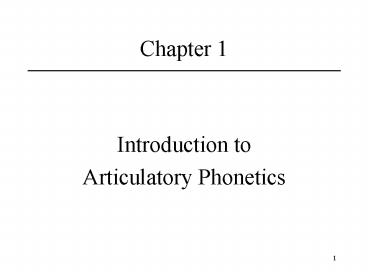Introduction to - PowerPoint PPT Presentation
1 / 28
Title:
Introduction to
Description:
Manner of Articulation. 6. Voicing ... (fill in plosives in manner of articulation chart) 15 ... represents manner of articulation on the vertical axis ... – PowerPoint PPT presentation
Number of Views:120
Avg rating:3.0/5.0
Title: Introduction to
1
Chapter 1
- Introduction to
- Articulatory Phonetics
2
Articulation
- Say Peter Piper picked a peck of pickled
peppers - while breathing out
- while breathing in
- Which is easier?
- Most speech sounds start in outgoing breath from
the lungs - The sounds ride on the pulmonic airstream
mechanism vocal tract diagram to label
3
(No Transcript)
4
The Vocal Tract
- lips
- teeth
- alveolar ridge
- hard palate
- velum (soft palate)
- tongue tip
- tongue blade
- tongue root
- uvula
- larynx
- vocal folds
- nasal tract
5
The Classification of Speech Sounds
- Based on
- Voicing
- Place of Articulation
- Manner of Articulation
6
Voicing
- The primary division in the classification of
sounds is voiced vs. voiceless - Voiceless - vocal folds are apart and relaxed
- Voiced - vocal folds come together and vibrate as
air comes up from lungs - Speech Segment Voicing
7
Voiced Segments in English
voice
-voice
cons
p,t,k,f,T,s,S
-consonant
b,d,g,v,D,z,Z m,n,N,r,l,w,y
i,A,u, etc.
8
Place of Articulation
- Generalized Place of Articulation
- Detailed Place of Articulation
9
Generalized Place of Articulation
- Primary Articulators
- lips (LABIAL)
- tongue tip blade (CORONAL)
- tongue root (DORSAL)
10
Generalized Place of Articulation
- Classification
- LABIAL (lips)
- p,b,m,w,f,v
- CORONAL (blade)
- T,D,t,d,
- s,z,S,Z,n,
- r,l,j
- DORSAL (body)
- k,g,N,w
- missing h
11
Detailed Place of Articulationfor English
Consonants
- Bilabial Labio Dental Alveolar Post Palatal
Velar Glottal Dental
Alv
12
Detailed Place of Articulationfor English
Consonants
- Bilabial Labio Dental Alveolar Post Palatal
Velar Glottal Dental
Alv
p b m w
t d s z n ? l
k g N
f v
T D
S Z
h
j
(w)
13
Manner of Articulationfor English Consonants
- Plosive (stop)
- Fricative
- Nasal
- Approximant
- Lateral Approximant
14
Plosive (Stop)
- Characterized by complete closure of vocal tract
- followed by release (pre-vocalically)
- (put hand in front of mouth to feel burst in
pill) - A stop cannot be prolonged (as opposed to other
consonants) cf. happen, versus ever, owing - (fill in plosives in manner of articulation
chart)
15
Fricative
- partial vocal tract obstruction
- gives turbulent airflow
- (cf. the narrowing of a wide river makes
whitewater) - (fill in chart)
16
Nasal
- stoppage in oral cavity
- velum lowers allowing air flow thru nasal cavity
- (hold nose and try saying day then nay)
- (fill in chart)
17
Approximant
- approximates a consonant in constriction of vocal
tract - not enough closure to cause turbulent air flow
- not open enough to be a vowel
- (fill in chart)
18
Lateral Approximant
- tongue center constriction (at alveolar ridge in
English) - air flows along sides of tongue
- (fill in chart)
19
Manner of Articulationfor English Consonants
k g N
stop fric nasal approx lateral
p b m w
t d s z n ? l
f v
T D
S Z
h
j
(w)
20
The Consonant Chart
- represents voicing by position left is -V, right
is V - represents place of articulation on the
horizontal axis - leftmost column corresponds to front of vocal
tract - rightmost column to back of vocal tract
- represents manner of articulation on the vertical
axis - top row corresponds to most closed articulation
(stop) - bottom row to most open articulation (approximant)
21
Practice
- Homework
- fill in the two charts labeled English
Consonants - Quiz in class on Tuesday
- Dictation Consonants plus only one vowel i as
in eat - parameter quiz (write the symbol for the voice
velar stop) - Identify parts of the vocal tract from class
worksheet
22
Vowel Intro
- Vowels are described mainly in acoustic and
auditory terms - we hear some vowels as higher than others
- some as more front than others
- the notion of height corresponds somewhat with
tongue height - the notion of fronting corresponds somewhat
with forward tongue position
23
Vowels are Classified for
- height
- tongue advancement
- rounding
24
English Vowels
- Vowel Chart
i
i
e
u
E
A
A
wksht 2 Vowel Classification
25
English Vowel Chart
- Front Mid Back
i
u
High
I
U
oU
eI
?
Mid
E
?
Q
A
Low
rounded
26
Spanish Vowel Chart
- Front Mid Back
i
u
High
o
Mid
e
Low
a
rounded
27
How likely is this language?
- Front Mid Back
High
y
?
eI
?
o
Mid
?
e
a
Low
rounded unrounded
28
Principle of Sufficient Perceptual Separation
- The sounds of a language are kept acoustically
distinct so the listener can distinguish one
sound from another - central vowels are minimized
- front vowels are usually unrounded
- back vowels are usually rounded































